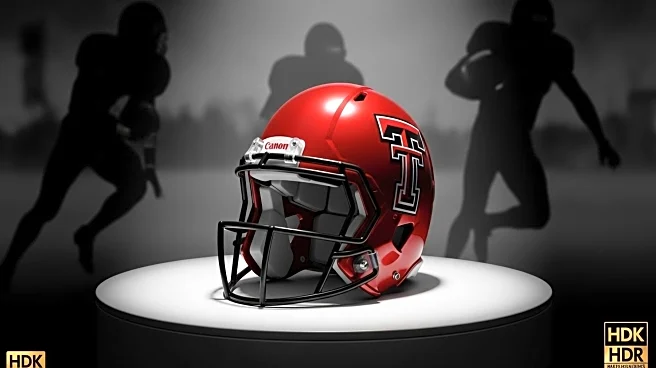What's Happening?
Texas Tech has made headlines with its strategic use of Name, Image, and Likeness (NIL) deals to build a competitive football roster. The program, historically not considered a powerhouse, has invested tens of millions in NIL deals, allowing it to secure top talent and revamp its team. This approach has led to Texas Tech's impressive 34-10 victory over Utah, showcasing the effectiveness of their investment. The team has incorporated seven new defensive starters from the transfer portal, surpassing even LSU's six new starters. This aggressive strategy has sparked discussions about the evolving landscape of college football, where financial investments in player recruitment are becoming increasingly significant.
Why It's Important?
The use of NIL deals by Texas Tech highlights a shift in college football dynamics, where financial resources can significantly impact team performance. This approach challenges traditional power structures, allowing programs with substantial financial backing to compete with historically dominant teams. The implications extend beyond Texas Tech, as other programs may adopt similar strategies, potentially altering competitive balances within conferences. The debate centers around the ethics and sustainability of such practices, with concerns about the impact on smaller programs and the overall integrity of college sports. Stakeholders, including coaches, players, and administrators, are closely monitoring these developments, which could lead to changes in regulations governing NIL deals.
What's Next?
As Texas Tech continues to leverage NIL deals, other programs may follow suit, leading to increased competition in player recruitment. This could prompt discussions among NCAA officials and conference leaders about potential regulatory changes to ensure fair play and maintain competitive balance. Additionally, Texas Tech's success may influence other sports within the university to explore similar strategies, potentially affecting Olympic and women's sports. The broader college sports community will likely engage in debates about the long-term implications of NIL deals, considering both the benefits and challenges they present.
Beyond the Headlines
The ethical considerations surrounding NIL deals in college sports are complex, involving questions about equity and the commercialization of amateur athletics. As financial investments become more prominent, there is a risk of widening the gap between well-funded programs and those with limited resources. This could lead to a reevaluation of the values and priorities within college sports, emphasizing the need for policies that balance financial opportunities with the preservation of competitive integrity. The cultural impact of these changes may also influence how college sports are perceived by fans and the public, potentially reshaping the traditional narratives associated with amateur athletics.









